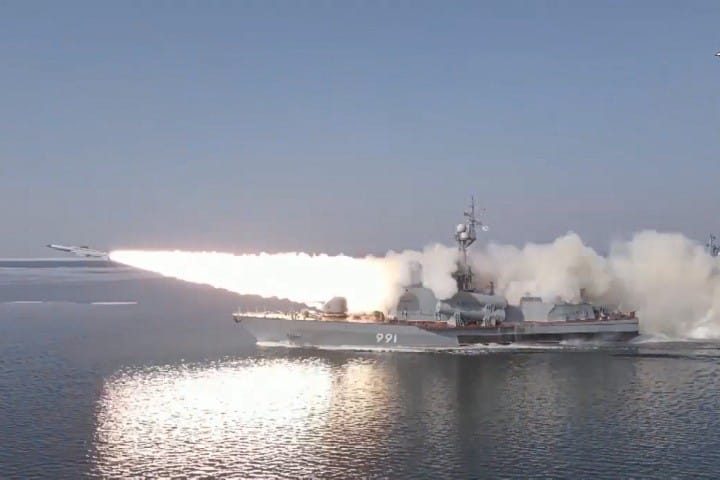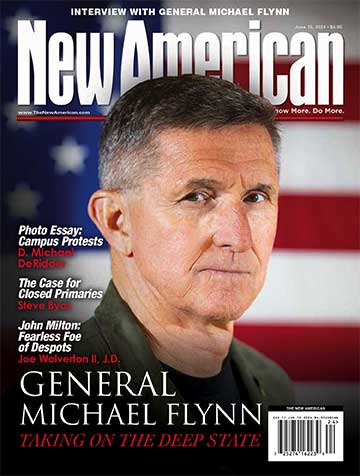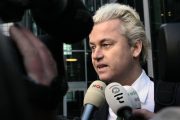
Russia will stage missile launches and torpedo tests as part of an inspection of its Pacific naval fleet, Defense Minister Sergei Shoigu said Friday.
The military drills come in the wake of increased tensions in the Asia-Pacific region, as the United States and South Korea conduct joint air exercises after an intercontinental ballistic missile test by communist North Korea.
“The main objective of this inspection is to increase the ability of the Armed Forces to repel the aggression of a probable enemy from the direction of ocean and sea,” Shoigu said on state television.
Chief of General Staff Valery Gerasimov announced that Russia’s naval forces would be mobilized to training areas to stage combat exercises and placed on high alert during the drills.
Moreover, the drills simulate an enemy landing on Russia’s Sakhalin island and on its southern Kuril Islands, some of which are claimed by Japan in a territorial spat traceable to the end of the Second World War.
When questioned about the exercises, Kremlin spokesman Dmitry Peskov downplayed any links to regional hostilities.
“This is a common practice, it has been constantly carried out in recent years and it continues. This is about maintaining the necessary level of combat readiness of our armed forces,” Peskov remarked during a daily news briefing.
Previously on March 28, Russia’s navy fired supersonic anti-ship missiles at a mock target in the Sea of Japan. Furthermore, the country flew two strategic bombers over the Sea of Japan for over seven hours in March, just as Japanese Prime Minister Fumio Kishida was starting a visit to Ukraine as a display of support for Kyiv in its conflict with Russia.
This Sunday, Chinese Defense Minister Li Shangfu is scheduled to visit Russia for four days at the invitation of his Russian counterpart Shoigu.
The Russian Defense Ministry announced on Friday that “Chinese Defense Minister Colonel General Li Shangfu will pay an official visit to Russia from April 16-18, 2023.”
“This is his first foreign trip after being appointed head of the Chinese military department in March 2023. Talks between Russian Defense Minister Sergei Shoigu and his Chinese counterpart are planned during the visit,” the statement read.
Both countries are slated to talk about possibilities for bilateral defense cooperation, as well as regional and global security matters, the ministry revealed.
The United States had hitherto imposed sanctions on the Chinese defense minister for touting his country’s military cooperation with Russia. Li’s upcoming meetings with Shoigu come after Chinese leader Xi Jinping’s visit to Russia last month, when he met with Russian President Vladimir Putin to discuss a range of key issues, including the Ukraine conflict and Western-led sanctions against Russia.
Chinese Defense Ministry spokesman Tan Kefei highlighted that the armed forces of both Russia and China have made progress in the past few years in the fields of “strategic communications, joint exercises and practical cooperation.”
Shortly after the onset of the Russo-Ukraine conflict last February, the United States and its allies enforced anti-Russian sanctions. However, many contend that these sanctions eventually backfired on the West.
From March 2022 to March 2023, 39 Russian billionaires sanctioned by the West have regained $104 billion of wealth, with only three witnessing their wealth drop during that time frame. Additionally, another seven sanctioned billionaires increased their fortunes enough to revert to the 2023 ranks of the world’s richest people, Forbes reported.
“Their assets have survived remarkably well,” says Viktor Winkler, a sanctions lawyer and former head of global sanctions standards at German bank Commerzbank. “[Before 2022] a very large and significant portion of their wealth had already been parked in countries which [don’t] adopt the sanctions of the West. Many have been able to react to incoming sanctions after February 23 since they … have been sanctioned only much later after Putin’s invasion.”
Besides, high commodity prices for oil, minerals, and metals last year also enhanced profits for Russian firms and Putin, according to Enerdata. As of April 13 this year, the MOEX Russia Index, which monitors the 50 largest companies traded on the Moscow Stock Exchange, has increased by 31 percent from its lowest point on September 26 and was down only 18 percent from the day before Russian tanks entered Ukraine. Notably, the ruble has returned to its prewar value against the U.S. dollar, up 65 percent from its rock-bottom value in March last year.
The annals of history also divulge that in past economic and political struggles, Russia and its people were united in the face of a common enemy, traditionally symbolized by the West. The then-communist Soviet Union was united during the Second World War and the Cold War around the notion of self-sacrifice, comprising what the Soviets deemed as a superior nation that values the enigmatic Russian dusha (“soul”) over the materialistic West.
Notwithstanding the futility of sanctions and other means of isolating Russia, the West, led by the Biden administration, has continued to try to villainize Russia and bring Putin down, even getting the legally questionable International Criminal Court (ICC) to issue an arrest warrant for the Russian leader.
Nonetheless, a new bombshell report by U.S.-based investigative outlet The Grayzone posited that Karim Khan, the ICC prosecutor general, raked in millions after the ICC issued Putin’s arrest warrant on the pretext that Putin permitted children to escape conflict zones.
“Through his focus on Ukraine, Khan has presided over a massive surge in Western financial support for his office, with much of the money earmarked for his investigation into Russian officials,” asserted The Grayzone editor Max Blumenthal, who highlighted that “the ICC’s issuance of Putin’s arrest warrant happened to coincide with a major donor’s conference for the court in London, England.”
Elaborating, The Grayzone stated that with various “justice ministers from the UK and UK allies on hand,” $5 million was raised during an event held by the British and Dutch governments backing “the ICC’s mission to prosecute Russian officials.”
Additionally, The Grayzone claimed that the ICC’s focus on Russia started long before Putin’s warrant was issued, tracing back to the leadership change that took place in 2021. During that year, Khan replaced then-prosecutor general Fatou Bensouda, who had faced sanctions and had her U.S. visa revoked after her decision to investigate American war crimes in Afghanistan.
As The Grayzone previously pointed out, the U.S. State Department had backed the ICC’s warrant to Putin without tangible evidence of Putin’s alleged war crimes. Rather, investigators admitted finding “no documentation of child mis-treatment, including sexual or physical violence, among the camps referenced in this report.” Also, the investigation’s lead author told The Grayzone’s Jeremy Loffredo that “a large amount” of the Russian youth camps his team researched were “primarily cultural education — like, I would say, teddy bear.”
It must be noted that while Khan is closely linked to Western governments that are entwined in a proxy battle with Russia in Ukraine, he has halted ICC’s case against Israel, impeding human-rights lawyers who represent the victims of brutal violence in the Gaza Strip. What is more, Khan formally dropped the ICC’s case against the U.S. military for its actions in Afghanistan.
To boot, celebrity lawyer Amal Clooney (wife of American actor George Clooney) served as a special advisor to Khan’s office while concurrently advising the Ukrainian government on how to prosecute Russian officials by the ICC or another international entity.
Even The Guardian, a mainstream publication, has associated the date of Putin’s arrest warrant with a key ICC fundraiser, implying Khan issued the warrant in time to align with a donor conference in London.



